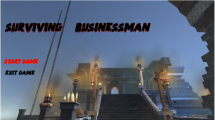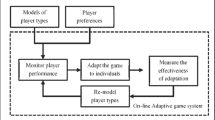Abstract
Nowadays, there is an increased interest in using computer games for educational purposes. Educational computer games attempt to increase the students’ motivation and engagement. However, they should provide adaptivity to learners’ different needs and characteristics for better educational results. Towards this direction, this paper presents a novel adaptive educational game named FuzzEG, which teaches the knowledge domain of HTML programming language. It uses fuzzy sets to represent the learner’s knowledge level more realistically. Taking into consideration the learner’s progress, the game decides about the level of difficulty of the quizzes and whether the scenario is going to be dynamically expanded or not. The gain of this is that it provides the learner with a personalised learning and gaming experience. The game has been evaluated, and the results are very encouraging.





























Similar content being viewed by others
References
Boyle T (1997) Design for multimedia learning. Prentice-Hall Inc., Englewood Cliffs
Chrysafiadi K, Virvou M (2010) Modeling student’s knowledge on programming using fuzzy techniques. In: Intelligent Interactive Multimedia Systems and Services. Springer, pp 23–32
Chrysafiadi K, Virvou M et al (2016) Advances in personalized web-based education. Springer, Berlin
DApice C, Grieco C, Piscopo R, Liscio L (2015) Dms2015short-2: Advanced learning technologies for elearning in the enterprise: Design of an educational adventure game to teach computer security. J Vis Lang Comput 31:260–266
Drigas AS, Argyri K, Vrettaros J (2009) Decade review (1999-2009): artificial intelligence techniques in student modeling. In: World Summit on Knowledge Society. Springer, pp 552–564
ESA (2014) Esa 2014 annual report. http://www.theesa.com/wp-content/uploads/2015/03/ESA-2014-Annual-Report.pdf, accessed: 2018-04-10
Gaeta M, Loia V, Mangione GR, Orciuoli F, Ritrovato P, Salerno S (2014) A methodology and an authoring tool for creating complex learning objects to support interactive storytelling. Comput Hum Behav 31:620–637
Hou HT, Li MC (2014) Evaluating multiple aspects of a digital educational problem-solving-based adventure game. Comput Hum Behav 30:29–38
Jeremić Z, Jovanović J, Gašević D (2012) Student modeling and assessment in intelligent tutoring of software patterns. Expert Syst Appl 39(1):210–222
Karpinskyj S, Zambetta F, Cavedon L (2014) Video game personalisation techniques: a comprehensive survey. Entertain Comput 5(4):211–218
Lo JJ, Chan YC, Yeh SW (2012) Designing an adaptive web-based learning system based on students cognitive styles identified online. Comput Educ 58(1):209–222
Martí-Parreño J, Galbis-Córdova A, Miquel-Romero MJ (2017) Students’ attitude towards the use of educational video games to develop competencies. Computers in Human Behavior
Mehm F, Göbel S, Steinmetz R (2012) Authoring of serious adventure games in storytec. In: E-learning and games for training, education, Health and Sports. Springer, pp 144–154
Minović M, Milovanović M, Šošević U, Mác González (2015) Visualisation of student learning model in serious games. Comput Hum Behav 47:98–107
Moreno-Ger P, Sierra JL, Martínez-Ortiz I, Fernández-Manjón B (2007) A documental approach to adventure game development. Sci Comput Programm 67 (1):3–31
Papert S (1993) The children’s machine: Rethinking school in the age of the computer. ERIC
Peirce N, Conlan O, Wade V (2008) Adaptive educational games: Providing non-invasive personalised learning experiences. In: 2008 Second IEEE International Conference on Digital games and intelligent toys based education. IEEE, pp 28–35
Petri G, von Wangenheim CG (2017) How games for computing education are evaluated? a systematic literature review. Comput Educ 107:68–90
Pilegard C, Mayer RE (2016) Improving academic learning from computer-based narrative games. Contemp Educ Psychol 44:12–20
Pivec M (2007) Play and learn: potentials of game-based learning. Br J Educ Technol 38(3):387–393
Polycarpou I, Krausea J, Rader C, Kembel C, Poupore C, Chiu E (2010) Math-city: an educational game for k-12 mathematics. Procedia-Soc Behav Sci 9:845–850
Riemer V, Schrader C (2015) Learning with quizzes, simulations, and adventures: Students’ attitudes, perceptions and intentions to learn with different types of serious games. Comput Educ 88:160–168
Papadimitriou S, Virvou M (2017) Adaptivity in scenarios in an educational adventure game. In: 2017 8th International Conference on Information, Intelligence, Systems & Applications (IISA). IEEE, pp 1–6
Virvou M, Katsionis G, Manos K (2005) Combining software games with education: Evaluation of its educational effectiveness. J Educ Technol Soc 8(2):54–65
Virvou M, Katsionis G (2008) On the usability and likeability of virtual reality games for education: The case of vr-engage. Comput Educ 50(1):154–178
Wikipedia (2018a) List of video game genres. https://en.wikipedia.org/wiki/List_of_video_game_genres, accessed: 2018-04-10
Wikipedia (2018b) Colossal cave adventure. https://en.wikipedia.org/wiki/Colossal_Cave_Adventure, accessed: 2018-04-10
Zadeh LA (1996) Fuzzy logic= computing with words. IEEE Trans Fuzzy Syst 4(2):103–111
Zapata-Rivera D (2010) Adaptive, assessment-based educational games. In: International Conference on Intelligent Tutoring Systems. Springer, pp 435–437
Author information
Authors and Affiliations
Corresponding author
Additional information
Publisher’s note
Springer Nature remains neutral with regard to jurisdictional claims in published maps and institutional affiliations.
Rights and permissions
About this article
Cite this article
Papadimitriou, S., Chrysafiadi, K. & Virvou, M. FuzzEG: Fuzzy logic for adaptive scenarios in an educational adventure game. Multimed Tools Appl 78, 32023–32053 (2019). https://doi.org/10.1007/s11042-019-07955-w
Received:
Revised:
Accepted:
Published:
Issue Date:
DOI: https://doi.org/10.1007/s11042-019-07955-w




